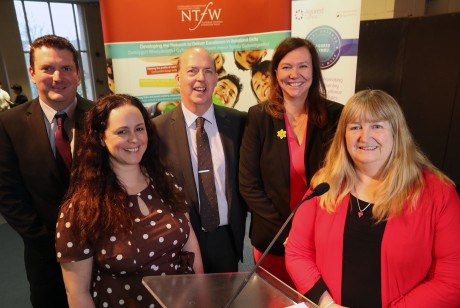
Minister highlights crucial role of work-based learning in Wales

Conference speakers (from left) Mark McDonough from Grŵp Llandrillo Menai, Kelly Edward, the NTfW’s head of work-based learning quality, Mark Evans, Her Majesty’s Inspector from Estyn, Sarah John, the NTfW’s chairman and Julie James, Minister for Skills and Science.
The crucial role work-based learning practitioners play as educators in Wales’ learning system was highlighted by Minister for Skills and Science, Julie James, at a major conference in Cardiff.
She told more than 230 delegates at the ‘Strengthening Skills for Success’ conference, organised by the National Training Federation for Wales (NTfW and sponsored by the Welsh Government, that she wanted to see more young people choosing apprenticeships when they leave school.
She also wants more apprenticeships in priority sectors, particularly science, technology, engineering and mathematics (STEM) and continued growth in higher and degree apprenticeships as a real alternative to university study. In addition, she is seeking the continued development of Welsh medium learning across the work-based sector.
The Welsh Government has pledged to deliver at least 100,000 quality apprenticeships which address employer needs and build higher level skills in the Welsh workforce. “The programme needs to continue to develop and grow, but the good news is that there are real opportunities out there, including new employers to be brought on board and new sectors to develop,” she said.
“We have three Regional Skills Partnerships geared up to work with you and with employers to ensure the supply of apprenticeships matches demand.”
She referred to the UK Government’s apprenticeship levy, which will be paid by all employers with a payroll of £3 million or more from April 6 this year. A Welsh Government team of advisors will be working with employers to ensure that the apprenticeship offer meets their needs and £15 million is being invested in the support programme.
“The levy means that new employers are starting to be interested in apprenticeships and they will expect training that is customised to their business and workforce,” she told delegates. “Practitioners will need to develop and refresh their skills to deliver new frameworks at higher levels.
“None of this is simple, but the potential rewards are huge, including a world class, responsive apprenticeship programme which provides hands-on experience, qualifications and long-term career prospects.”
The minister called for work-based learning practitioners to be recognised as professional educators and welcomed their registration with the Education Workforce Council from April 1.
The inaugural conference, held at the All Nations Centre, was designed to provide professional development opportunities and to explore the future landscape for teaching, learning and assessment across the work-based learning sector in Wales. The conference was quality marked by Agored Cymru, the Welsh awarding body.
Sarah John, NTfW chairman, commended delegates for achieving an enviable apprenticeship attainment rate of more than 80 per cent in Wales compared to England’s current rate of 67 per cent.
The drive towards more higher apprenticeships in Wales had seen an increase from 16 per cent to 22 per cent in just one contract year. “But there is more work to do if we are to meet the growing needs of employers, particularly as the apprenticeship levy starts to create increased demand.
“Providers need to be responsive, agile and flexible to meet emerging needs for higher level learning. Traditional models may need to be adapted to include greater collaboration between delivery bodies and we need to support the small and medium-sized enterprises (SME) sector in Wales particularly around entrepreneurship and innovation.”
Mark Evans, Her Majesty’s Inspector from Estyn, emphasised the importance of effective planning at the beginning of training programmes to ensure that targets for learners and employers are set and achieved on time. He encouraged practitioners to ensure that their technical knowledge is up to date and that they challenge learners to achieve their full potential.
Angela Jardine, Education Workforce Council chair, said the NTfW had been campaigning for the professional recognition of work-based practitioners for up to 30 years. “It will raise the status of the work that you do and from April 1, you will be professionals, officially,” she added.
The other speakers were Linda Chorley, from City & Guilds and Mark McDonough, from Grwp Llandrillo Menai, who was Assessor of the Year in last year’s Apprenticeship Awards Cymru.
Practical workshops and discussion opportunities supported delegates to further enhance knowledge and innovation. The event was aligned to the NTfW’s Quality Improvement Project, which is supported and part-funded by Welsh Government through the European Social Fund.
More News Articles
« Minister launches hunt for 2017 Apprenticeship Awards Cymru stars — NTfW Newsletter – April 2017 »

